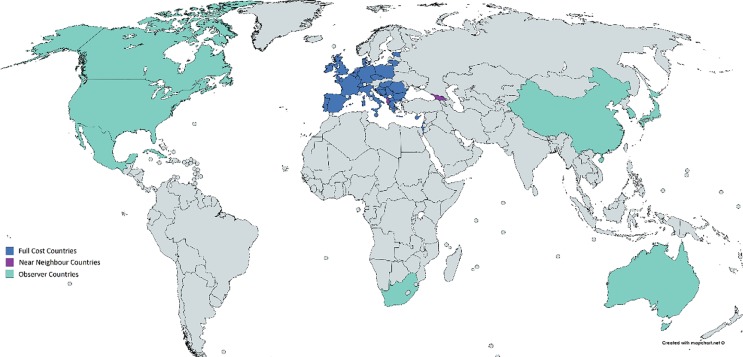当前位置:
X-MOL 学术
›
Eur. Neuropsychopharm.
›
论文详情
Our official English website, www.x-mol.net, welcomes your
feedback! (Note: you will need to create a separate account there.)
Manifesto for a European research network into Problematic Usage of the Internet
European Neuropsychopharmacology ( IF 6.1 ) Pub Date : 2018-11-01 , DOI: 10.1016/j.euroneuro.2018.08.004 N A Fineberg 1 , Z Demetrovics 2 , D J Stein 3 , K Ioannidis 4 , M N Potenza 5 , E Grünblatt 6 , M Brand 7 , J Billieux 8 , L Carmi 9 , D L King 10 , J E Grant 11 , M Yücel 12 , B Dell'Osso 13 , H J Rumpf 14 , N Hall 15 , E Hollander 16 , A Goudriaan 17 , J Menchon 18 , J Zohar 19 , J Burkauskas 20 , G Martinotti 21 , M Van Ameringen 22 , O Corazza 15 , S Pallanti 23 , , S R Chamberlain 4
European Neuropsychopharmacology ( IF 6.1 ) Pub Date : 2018-11-01 , DOI: 10.1016/j.euroneuro.2018.08.004 N A Fineberg 1 , Z Demetrovics 2 , D J Stein 3 , K Ioannidis 4 , M N Potenza 5 , E Grünblatt 6 , M Brand 7 , J Billieux 8 , L Carmi 9 , D L King 10 , J E Grant 11 , M Yücel 12 , B Dell'Osso 13 , H J Rumpf 14 , N Hall 15 , E Hollander 16 , A Goudriaan 17 , J Menchon 18 , J Zohar 19 , J Burkauskas 20 , G Martinotti 21 , M Van Ameringen 22 , O Corazza 15 , S Pallanti 23 , , S R Chamberlain 4
Affiliation

|
The Internet is now all-pervasive across much of the globe. While it has positive uses (e.g. prompt access to information, rapid news dissemination), many individuals develop Problematic Use of the Internet (PUI), an umbrella term incorporating a range of repetitive impairing behaviours. The Internet can act as a conduit for, and may contribute to, functionally impairing behaviours including excessive and compulsive video gaming, compulsive sexual behaviour, buying, gambling, streaming or social networks use. There is growing public and National health authority concern about the health and societal costs of PUI across the lifespan. Gaming Disorder is being considered for inclusion as a mental disorder in diagnostic classification systems, and was listed in the ICD-11 version released for consideration by Member States (http://www.who.int/classifications/icd/revision/timeline/en/). More research is needed into disorder definitions, validation of clinical tools, prevalence, clinical parameters, brain-based biology, socio-health-economic impact, and empirically validated intervention and policy approaches. Potential cultural differences in the magnitudes and natures of types and patterns of PUI need to be better understood, to inform optimal health policy and service development. To this end, the EU under Horizon 2020 has launched a new four-year European Cooperation in Science and Technology (COST) Action Programme (CA 16207), bringing together scientists and clinicians from across the fields of impulsive, compulsive, and addictive disorders, to advance networked interdisciplinary research into PUI across Europe and beyond, ultimately seeking to inform regulatory policies and clinical practice. This paper describes nine critical and achievable research priorities identified by the Network, needed in order to advance understanding of PUI, with a view towards identifying vulnerable individuals for early intervention. The network shall enable collaborative research networks, shared multinational databases, multicentre studies and joint publications.
中文翻译:

欧洲研究网络关于互联网使用问题的宣言
互联网现在已在全球大部分地区普及。虽然它具有积极的用途(例如,及时获取信息、快速传播新闻),但许多人出现了“互联网使用问题”(PUI),这是一个涵盖一系列重复性损害行为的总称。互联网可以充当功能障碍行为的渠道,并可能助长这些行为,包括过度和强迫性视频游戏、强迫性性行为、购买、赌博、流媒体或社交网络使用。公众和国家卫生当局越来越关注 PUI 在整个生命周期中造成的健康和社会成本。游戏障碍正在被考虑作为一种精神障碍纳入诊断分类系统,并被列入供会员国考虑发布的 ICD-11 版本中 (http://www.who.int/classifications/icd/revision/timeline/ zh/).需要对疾病定义、临床工具验证、患病率、临床参数、脑生物学、社会健康经济影响以及经经验验证的干预和政策方法进行更多研究。需要更好地了解 PUI 类型和模式的程度和性质方面的潜在文化差异,以便为最佳卫生政策和服务开发提供信息。为此,欧盟在“地平线2020”下启动了一项新的为期四年的欧洲科学技术合作(COST)行动计划(CA 16207),汇集了冲动、强迫和成瘾性疾病领域的科学家和临床医生,推进欧洲及其他地区 PUI 的网络化跨学科研究,最终为监管政策和临床实践提供信息。 本文描述了该网络确定的九个关键且可实现的研究重点,以促进对 PUI 的了解,从而识别弱势个体进行早期干预。该网络应支持协作研究网络、共享跨国数据库、多中心研究和联合出版物。
更新日期:2018-11-01
中文翻译:

欧洲研究网络关于互联网使用问题的宣言
互联网现在已在全球大部分地区普及。虽然它具有积极的用途(例如,及时获取信息、快速传播新闻),但许多人出现了“互联网使用问题”(PUI),这是一个涵盖一系列重复性损害行为的总称。互联网可以充当功能障碍行为的渠道,并可能助长这些行为,包括过度和强迫性视频游戏、强迫性性行为、购买、赌博、流媒体或社交网络使用。公众和国家卫生当局越来越关注 PUI 在整个生命周期中造成的健康和社会成本。游戏障碍正在被考虑作为一种精神障碍纳入诊断分类系统,并被列入供会员国考虑发布的 ICD-11 版本中 (http://www.who.int/classifications/icd/revision/timeline/ zh/).需要对疾病定义、临床工具验证、患病率、临床参数、脑生物学、社会健康经济影响以及经经验验证的干预和政策方法进行更多研究。需要更好地了解 PUI 类型和模式的程度和性质方面的潜在文化差异,以便为最佳卫生政策和服务开发提供信息。为此,欧盟在“地平线2020”下启动了一项新的为期四年的欧洲科学技术合作(COST)行动计划(CA 16207),汇集了冲动、强迫和成瘾性疾病领域的科学家和临床医生,推进欧洲及其他地区 PUI 的网络化跨学科研究,最终为监管政策和临床实践提供信息。 本文描述了该网络确定的九个关键且可实现的研究重点,以促进对 PUI 的了解,从而识别弱势个体进行早期干预。该网络应支持协作研究网络、共享跨国数据库、多中心研究和联合出版物。











































 京公网安备 11010802027423号
京公网安备 11010802027423号